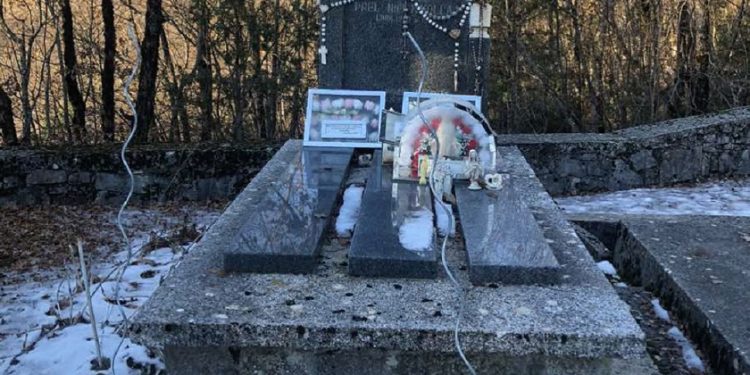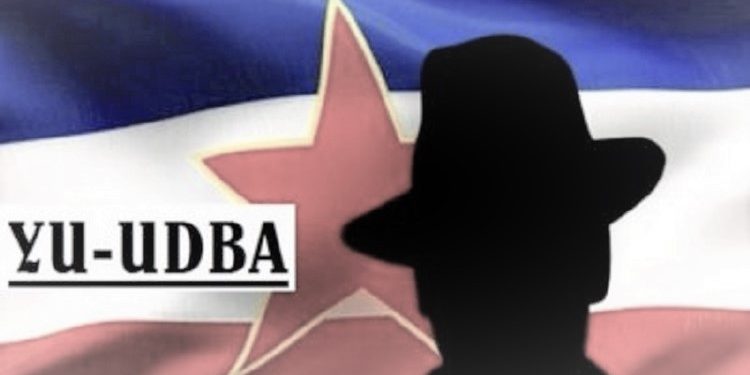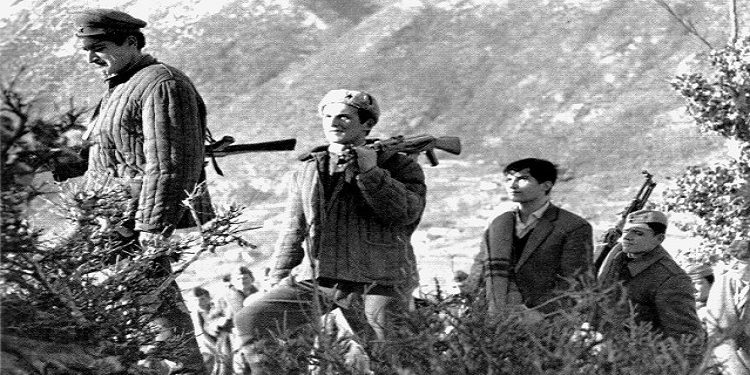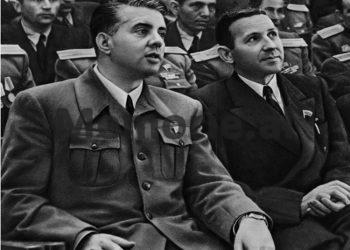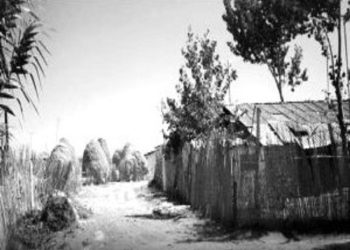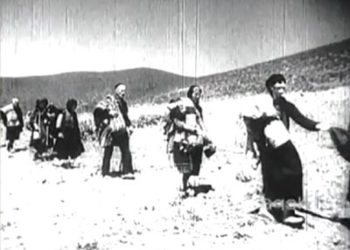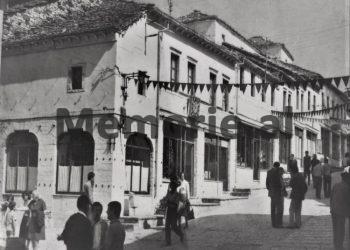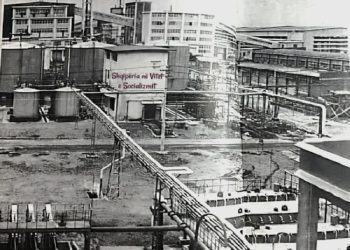The Conspiracy against the Triesh Highlanders
Memorie.al / The Communist Party of Yugoslavia brought many killings, crimes, and tortures to the Triesh Mountain, just like all other Albanian regions. This military force, which, in the name of the fight for liberation, spread its Stalinist ideological roots and exercised violence and barbarism against the local population, against the Triesh nationalists and anti-communists (Albanians) who refused the dictate ordered by the Slavic (Serbo-Montenegrin) emissaries. During and after World War II, dozens of Triesh inhabitants were killed by the Albanians’ centuries-old enemies. Very little has been written about these brave men of this patriotic region, victims of Communism, who did not reconcile with and opposed the diabolical anti-national plans of the Slavic communists.
Their commitment and activity in defending their Arbëresh lands have remained unwritten history until today, even by Albanian historians, not only in Montenegro but unfortunately, also in Albania. Until a few decades ago, the families of these victims mostly remained silent. Not because they did not wish for their truth to be illuminated. Instead, they were afraid of the consequences of the fierce communist regime and its blind servants. This was the main reason why the family members of the victims of communism in Triesh, and elsewhere, did not even dare to speak about them, having inherited the chilling, centuries-old Albanian phrase from their fathers: “Hush, don’t speak, even the wall has ears!”
Nikoll Gjolaj: The Betrayed Anti-Communist
The Gjolaj family, from the village of Muzheçk in Triesh, for the first time broke the 76-year silence about the execution of their son, Nikollë Gjon Curi, at the age of 24. Gjon Dodë Gjolaj, who lives in Tuz, referring to the oral testimonies of his grandfather, Prekë Uci, and grandmother, Mri Baca, recounts the life, activity, and painful history of the killing of his cousin, Nikollë Gjoni, by the communist regime.
Nikollë Gjolaj was born in 1921 in the village of Muzheçk, into an honest, patriotic family. His parents, Gjon Cura Deda and Katrinë Lushkja Dushaj, from Traboini of Hoti, also had a son, Antoni. Nikolla was their second son. He came to life three years after his older brother. Both brothers, one at the age of 4 and the other at the age of 1, were orphaned after their father tragically died in the Adriatic Sea, near Ulqin (Ulcinj). Four years later, their mother also tragically died while tending to the livestock.
Antoni and Nikolla were taken care of and raised by their cousin, Prekë Ucë Deda, and his wife, Mari Bacja. At the age of sixteen, Nikolla went to Shkodër, where he stayed for about a year with Preka’s brother, Marash Uci. Then he went to Velipojë, where he stayed for about three years. In 1942, he joined the nationalist organization “Balli Kombëtar” (National Front), fighting against the communist partisan forces. “Thanks to his bravery and military skill,” his family members recount, “Nikolla was appointed Deputy Commander of the ‘Balli Kombëtar’ for Northern Albania. He remained loyal to this idea, even though the war was moving in favor of the communist regime.”
In the winter of 1944, after “Balli Kombëtar” suffered defeat, Nikolla returned to his birthplace, Muzheçk. In the autumn of 1945, Nikolla was invited to the Triesh Local Office in the village of Stjepoh. There, he was given a letter in a sealed envelope, with red wax, to deliver unopened to the Military Barracks in Tuz. Nikolla took the letter and returned home to Muzheçk. He told Mri Bacja about the task given to him by the Triesh communists. Mria had a premonition that this letter might pose a danger to young Nikolla.
Doubting the communists’ treachery, and despite their declarations that the letter posed no danger to Nikolla, she advised him not to go to Tuz, but to first go to Cem of Triesh, to Prekë Uci, open the letter, and then decide together how to act. Nikolla objected, telling her not to worry, that his comrades, the Triesh brothers with whom he associated and stayed with every day, would not betray him. Convinced that nothing bad would happen, he set off for Tuz. Mri Bacja, worried about Nikolla’s fate, went to her husband’s cousin, Pjetër Gjoka.
She informed him of Nikolla’s situation and asked him to stop him from going to Tuz and instead have him go to Cem of Triesh, to Prekë Uci. Pjetër Gjoka immediately followed and reached Nikolla at the place called Qafë të Nagrivës. He tried to persuade and convince him to give up going to Tuz, but without success. Nikolla continued his fatal journey to Tuz, from where, after two days, the bitter news of his execution spread throughout the Malësia region. He was executed in the courtyard of the Tuz Military Barracks, in the former premises of the “Titeks” Textile Factory Unit. It is said that on that day, Nikolla, in the prime of his youth, was executed with two other Highlanders by the murderous bullets of the communists, and their lifeless bodies were thrown somewhere near Lake Shkodër, by the village of Nënhelm.
The Gjolaj family knows who the person suspected of having spied on Nikolla 76 years ago was. However, to this day, they know nothing more about their son’s murder, not even the place where his remains lie. To make matters worse, the Gjolaj family did not dare to make any official request to find their son’s remains during the communist regime. Members of this family were always under surveillance by the authorities of the time. The State Security Administration (UDBA) did not even leave Nikolla’s cousin, Dodë Preka, in Germany in peace; he did not dare to visit his family in Triesh for three years.
This is the exclusive testimony of the Gjolaj family about the unknown history of the murder of their son by the Serbo-Slavic communists, who fought alongside other Albanian nationalist fighters for the freedom of Albanians, for a free, democratic, and fraternal Albania, against the dictatorial communist regimes in Albania and Montenegro.
Dedë Nikë (Nici) Nikollaj: “I want to die with honor, as a Christian”
The number of Triesh inhabitants who were arrested, tortured, imprisoned, and executed by the totalitarian communist regime in Albania and the former Yugoslavia is not small. The exact number of those executed for political motives is still unknown, as these figures have never been made public by any state institution or by any Albanian or foreign historian. These anti-communist boys and men were forgotten by the state and Albanian historiography even after three decades of democracy, but they remained unforgettable in the popular (collective) memory of Triesh.
Not a single word was dared to be spoken about these brave men who stood up to and confronted the dictatorship and dictators of the time during the monist period, because their family members, relatives, and kin feared they would be harshly and mercilessly punished by the communist dictatorship. Unfortunately, this silence continues even today in the post-communist democratic era in some Triesh families who are still not free from the panic they experienced.
Some Triesh people executed by the communist dictatorship remain missing. Even today, many Triesh families that suffered communist persecution still do not know where the remains of their loved ones, killed during the dictatorship, are located. Among the rare Triesh people killed by the Yugoslav communists and buried in family cemeteries is Dedë Nikë (Nici) Nikollaj from the village of Muzheçk. He is an unknown name to the majority of Albanians. He was born in 1910 into a poor peasant family. His parents, Nika and Bjeshka, had three sons, Prela, Toma, and Deda, and two daughters, File and Pashka.
Dedë Nici lived in a family of fifteen members under extremely difficult conditions, just like most of his poor peers in Triesh. He grew up in misery, which is consistent with the legend of Migjeni. He was illiterate but was a patriot and a believer, like many other Muzheçk inhabitants. He married at the age of 31 to the daughter (name unknown) of Gjekë Ukë Dedvukaj, from the village of Bardhaj of Hoti, a close cousin of our national hero, Dedë Gjo’ Luli.
The happiness between these two spouses was short-lived. Only one year, when the Yugoslav partisans killed Dedë Nici at the age of 32. He was executed for the sole “crime” of being against the communist regime in 1945, near the place called Fjerrkuqe in Bardhaj of Hoti. Just before they executed him, the godless Slavic partisans demanded that Deda take off the cross he wore around his neck and desecrate it.
– “Take off that cross you wear around your neck and throw it to the ground!” the partisan officer shouted loudly.
– “No, I will not take off the cross while alive!” Deda replied with composure.
– “Either you take off the cross, or you will die,” the officer threatened again.
– “I want to die with honor, as a Christian,” were Dedë Nici’s last words before the execution. After uttering these words, the communist partisans killed him. Thus, another innocent life was extinguished, that of a young, newly married, and heirless man, taking with him the difficulties, sufferings, and great pains, and very few of the joys of this life.
His death permanently broke the hearts of his parents, brothers, sisters, and family members. After hearing the painful and unexpected news of their son’s murder, the family took his lifeless body and buried him in the family cemetery in his birthplace, without any large public funeral ceremony, due to fear of the regime of the time. His family members and descendants, unlike many Albanian families who still do not know the remains of their loved ones, had the fortune of having a place to lay a bouquet of flowers and light a candle for their beloved son.
The three nephews of Dedë Nici Nikollaj, Zefi, Nikolla, and Gjeloshi, who are in exile in the distant state of Australia, built his family grave. Whenever they come to their birthplace, they go to the grave to soothe his soul and that of their other family members whose remains rest there. His spilled blood will unite with the blood of all those Albanians unjustly killed by the communists. Their common blood will become a light for the Albanian people and for all Albanian lands.
Nikë Micakaj: The 32-year-old Victim
Albanian communists did not spare Nikë Marash Micakaj, from the village of Bëkaj of the Triesh mountain, from execution either. His only sin, for which he was killed, was that he loved the motherland – Ethnic Albania – with all his heart. This martyr of democracy and freedom was killed by Albanian communist military forces, without trial and without fault, at the age of 32 in May 1946, somewhere near the Deçiq Mountain.
Previously, the communist army surrounded his house and arrested him by surprise in Bardhaj, a place on the banks of the Cem River, between Grabom and Tamarë. Before the firing squad of communist executioners led by the infamous Lieutenant Baba, this brave, undefeated fighter, who never surrendered on his path, stood with dignity. That cruel day 76 years ago, that dark day of May 1946, will remain a severe, unhealed wound forever for his family, kin, Triesh, and the entire Malësia.
The Triesh native, Nikë Micakaj, known in Kelmend as Nikë Marash Ujka, and elsewhere as Nikë Dajaku, in love with Albania, was among those Albanian Highlanders (nationalists) maximally committed to the unification of the ethnic lands. He was one of those Highlander men who had sworn not to let Communism be installed in Albania, convinced that this ideology would ultimately suppress and destroy human personality.
This young man and patriot was never intimidated by the threats of either Enver Hoxha’s Albanian communists or Josip Broz Tito’s Serbo-Montenegrin ones, who at that time closely cooperated in exercising violence, torture, and execution without trial of Albanian nationalists and their families who did not support the communist regime (state).
The history of this anti-communist did not end with his murder. His remains have been perhaps forever lost. The grave of this brave, “forgotten” fighter is unknown to this day, like many other Highlanders who shed their blood by the red criminals, because they wanted Malësia and Ethnic Albania to be free and liberated from the communist occupiers, who were only interested in their own interests and positions and not the freedom of the Albanian lands.
Based on facts and the family dossier, Nikë Micakaj was born in 1914 in the village of Bëkaj of Triesh. He was the second son of his parents, Marash and Katrina (née Bojaj). He was raised and educated in a family with high national and manly sentiments. From his youth, he was molded and formed by listening to stories from his father, grandfather, and uncles about the bravery and generosity known in the Albanian lands of the Bëkaj brotherhood of Triesh.
Since his youth, he stood out from his peers for his bravery and intelligence, but also for his talent with firearms. His goal was to achieve the success of his grandfather, Ujkë Gjoni, who made the Serbian church priest curse the Kuçasi after the defeat they suffered several times in their revenge attacks on the Micakaj tribe. The reason for this curse was the fear of every Kuçasi who set out to take revenge on the Micakaj that they would be killed. The folk rhapsody best proves this through these verses: “…Ujk Gjon Cuku, young boy / left blood in the Serbian lands…”!
Nikë Micakaj was mobilized into the army in 1935. As a soldier, he was sent to Kotorr. There, while performing military service, he met a Yugoslav soldier who had been transferred (removed) from the Military Barracks in the village of Poprat (Triesh), where he had killed Nikë’s cousin, Zef Pura Micakaj, at the threshold of his house. After some time, the murderous soldier began to boast to Nikë that he had killed an Albanian, Zef Pura, in his hometown. Nikë, with deep anger and great resentment, vehemently replied: “Oh, heartless and cruel killer, you killed my brother!”
He quickly drew his weapon and left the bloody soldier dead on the spot. With the skill and agility he possessed, he managed to escape and survive the bursts of bullets from the Yugoslav soldiers. He first stopped in Ulqin, from where he went to Shkodër. There, he joined the volunteer anti-communist and nationalist insurgent gangs of Malësia e Madhe (Great Highlands).
This torchbearer of freedom actively participated with a rifle in hand in the uprisings that took place in Kelmend and other regions of Malësia e Madhe, against the Yugoslav-Albanian partisan pursuit forces. He fought bravely until death for the liberation of the Albanian lands from the communist clutches, alongside the popular leader of Kelmend and defender of the Vermosh borders from Serbo-Montenegrin aspirations, Prekë Cali, and other brave and unyielding fellow fighters in the insurgency, in which they were sentenced to death (execution), brutally killed, imprisoned, and deported to the internment camps of Kavajë, Tepelenë, Vloçisht, and to the most inhumane labor camps and prisons history has known. This fearless warrior and victim of the communist regime must never be forgotten by the noble people of Malësia e Madhe, nor by history, which should recognize him as a martyr and patriot. Memorie.al




